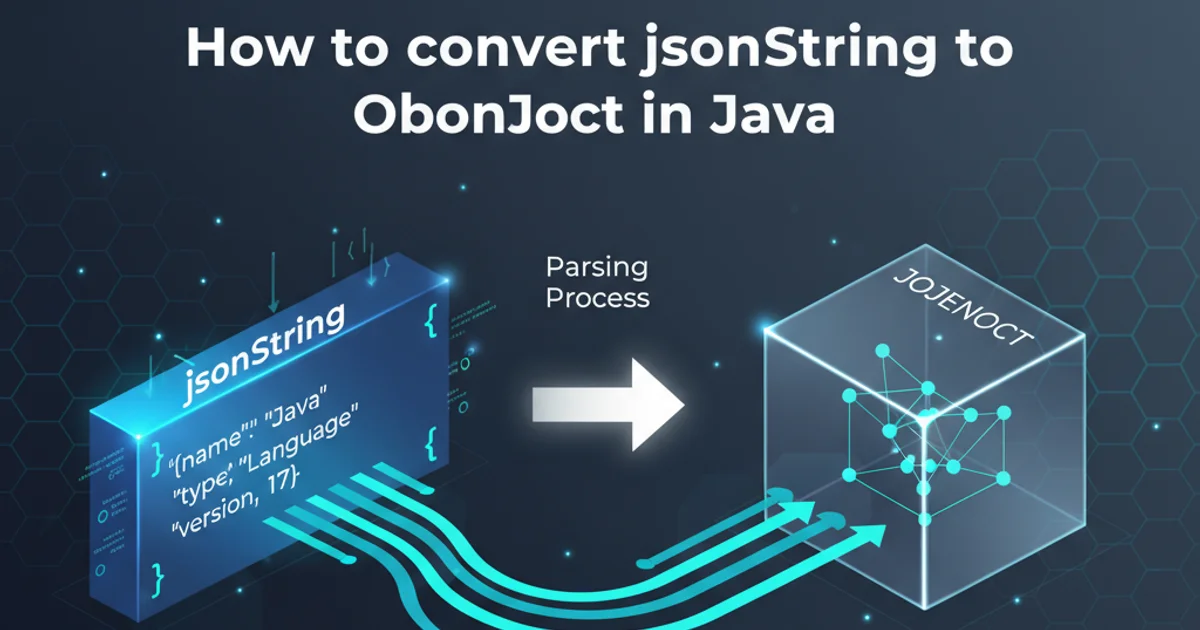How to convert jsonString to JSONObject in Java
Categories:
Converting JSON String to JSONObject in Java: A Comprehensive Guide

Learn how to parse JSON strings into Java JSONObject instances using popular libraries like org.json and Jackson, handling common pitfalls and best practices.
JSON (JavaScript Object Notation) has become the de facto standard for data interchange on the web due to its lightweight and human-readable format. In Java applications, you'll frequently encounter scenarios where you need to consume JSON data, often received as a String, and convert it into a manipulable JSONObject or a custom Java object. This article will guide you through the process using two widely adopted libraries: org.json (a simple, built-in option) and Jackson (a powerful, feature-rich alternative).
Understanding JSON Structure and Java Equivalents
Before diving into code, it's crucial to understand how JSON structures map to Java. A JSON object is an unordered collection of key/value pairs, similar to a Java Map or a custom class. A JSON array is an ordered collection of values, analogous to a Java List or array. Values can be strings, numbers, booleans, null, other objects, or arrays.
flowchart TD
A[JSON String] --> B{Parse JSON}
B --> C{Is it valid JSON?}
C -->|Yes| D[JSONObject / JSONArray]
C -->|No| E[Handle Parsing Error]
D --> F[Access Data (e.g., get("key"))]
F --> G[Use Data in Java Application]Basic workflow for parsing a JSON string in Java
Method 1: Using org.json Library
The org.json library is a simple and lightweight option often included in many projects or easily added as a dependency. It provides JSONObject and JSONArray classes that directly mirror their JSON counterparts. This library is straightforward for basic parsing tasks.
To use org.json, you need to add the following dependency to your pom.xml (for Maven) or build.gradle (for Gradle):
Maven:
<dependency>
<groupId>org.json</groupId>
<artifactId>json</artifactId>
<version>20231013</version>
</dependency>
Gradle:
implementation 'org.json:json:20231013'
import org.json.JSONObject;
import org.json.JSONException;
public class OrgJsonParser {
public static void main(String[] args) {
String jsonString = "{\"name\":\"Alice\",\"age\":30,\"city\":\"New York\"}";
try {
// Convert JSON string to JSONObject
JSONObject jsonObject = new JSONObject(jsonString);
// Access data from the JSONObject
String name = jsonObject.getString("name");
int age = jsonObject.getInt("age");
String city = jsonObject.getString("city");
System.out.println("Name: " + name);
System.out.println("Age: " + age);
System.out.println("City: " + city);
// Handling missing keys (optional)
String country = jsonObject.optString("country", "Unknown");
System.out.println("Country: " + country);
} catch (JSONException e) {
System.err.println("Error parsing JSON: " + e.getMessage());
e.printStackTrace();
}
}
}
Example of converting a JSON string to JSONObject using org.json.
Method 2: Using Jackson Databind Library
Jackson is a high-performance JSON processor for Java. It's more robust and offers advanced features like data binding (mapping JSON directly to custom Java objects), streaming API, and tree model. For complex JSON structures or when you need to map JSON to POJOs (Plain Old Java Objects), Jackson is the preferred choice.
To use Jackson, you need to add the following dependency to your pom.xml (for Maven) or build.gradle (for Gradle):
Maven:
<dependency>
<groupId>com.fasterxml.jackson.core</groupId>
<artifactId>jackson-databind</artifactId>
<version>2.16.1</version>
</dependency>
Gradle:
implementation 'com.fasterxml.jackson.core:jackson-databind:2.16.1'
import com.fasterxml.jackson.databind.JsonNode;
import com.fasterxml.jackson.databind.ObjectMapper;
import com.fasterxml.jackson.core.JsonProcessingException;
public class JacksonParser {
public static void main(String[] args) {
String jsonString = "{\"name\":\"Bob\",\"age\":25,\"occupation\":\"Engineer\"}";
ObjectMapper objectMapper = new ObjectMapper();
try {
// Convert JSON string to a JsonNode (tree model)
JsonNode rootNode = objectMapper.readTree(jsonString);
// Access data from the JsonNode
String name = rootNode.get("name").asText();
int age = rootNode.get("age").asInt();
String occupation = rootNode.get("occupation").asText();
System.out.println("Name: " + name);
System.out.println("Age: " + age);
System.out.println("Occupation: " + occupation);
// Example of mapping to a custom POJO (if you had one)
// MyPojo myPojo = objectMapper.readValue(jsonString, MyPojo.class);
// System.out.println("POJO Name: " + myPojo.getName());
} catch (JsonProcessingException e) {
System.err.println("Error parsing JSON with Jackson: " + e.getMessage());
e.printStackTrace();
}
}
}
Example of converting a JSON string to JsonNode using Jackson's tree model.
Handling JSON Arrays
Both org.json and Jackson provide mechanisms to parse JSON arrays. For org.json, you use JSONArray, and for Jackson, you can iterate over JsonNode if it represents an array.
import org.json.JSONArray;
import org.json.JSONObject;
import org.json.JSONException;
public class OrgJsonArrayParser {
public static void main(String[] args) {
String jsonArrayString = "[{\"id\":1,\"item\":\"Apple\"},{\"id\":2,\"item\":\"Banana\"}]";
try {
JSONArray jsonArray = new JSONArray(jsonArrayString);
for (int i = 0; i < jsonArray.length(); i++) {
JSONObject item = jsonArray.getJSONObject(i);
int id = item.getInt("id");
String itemName = item.getString("item");
System.out.println("Item ID: " + id + ", Name: " + itemName);
}
} catch (JSONException e) {
System.err.println("Error parsing JSON array: " + e.getMessage());
e.printStackTrace();
}
}
}
Parsing a JSON array using org.json.
import com.fasterxml.jackson.databind.JsonNode;
import com.fasterxml.jackson.databind.ObjectMapper;
import com.fasterxml.jackson.core.JsonProcessingException;
public class JacksonArrayParser {
public static void main(String[] args) {
String jsonArrayString = "[{\"id\":1,\"item\":\"Apple\"},{\"id\":2,\"item\":\"Banana\"}]";
ObjectMapper objectMapper = new ObjectMapper();
try {
JsonNode rootNode = objectMapper.readTree(jsonArrayString);
if (rootNode.isArray()) {
for (JsonNode node : rootNode) {
int id = node.get("id").asInt();
String itemName = node.get("item").asText();
System.out.println("Item ID: " + id + ", Name: " + itemName);
}
}
} catch (JsonProcessingException e) {
System.err.println("Error parsing JSON array with Jackson: " + e.getMessage());
e.printStackTrace();
}
}
}
Parsing a JSON array using Jackson.
try-catch blocks) when parsing JSON. Malformed JSON strings can lead to JSONException (for org.json) or JsonProcessingException (for Jackson), which can crash your application if not handled gracefully.Choosing the Right Library
The choice between org.json and Jackson depends on your project's needs:
org.json: Ideal for simple JSON parsing, quick scripts, or when you want minimal dependencies. It's easy to learn and use for basic object and array manipulation.- Jackson: Recommended for enterprise-level applications, complex JSON structures, performance-critical scenarios, and especially when you need to map JSON directly to custom Java objects (POJOs). It offers more control, better performance, and extensive features like custom serializers/deserializers.
By understanding these methods, you can effectively convert JSON strings into Java objects, enabling your applications to interact seamlessly with JSON-based APIs and data sources.